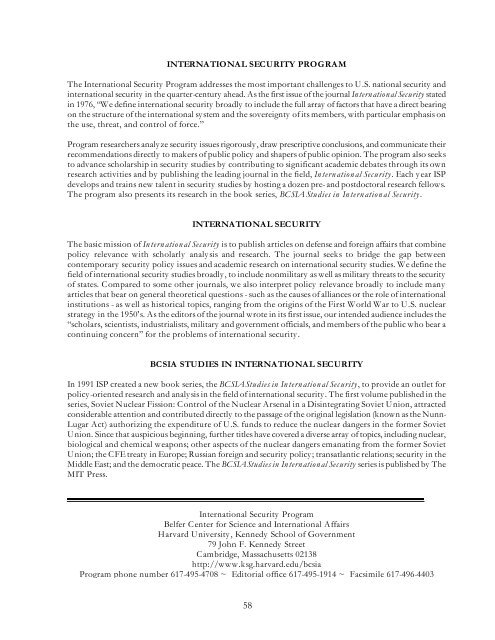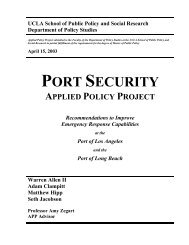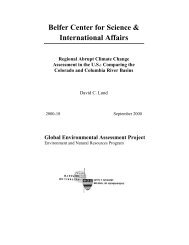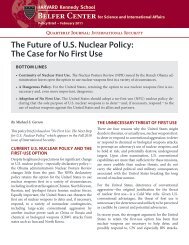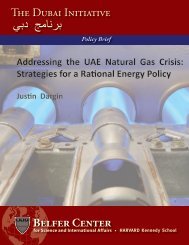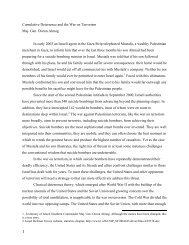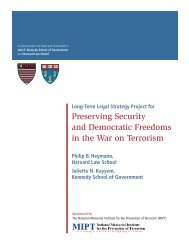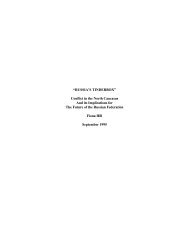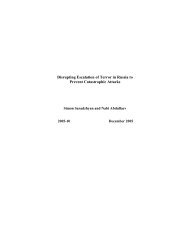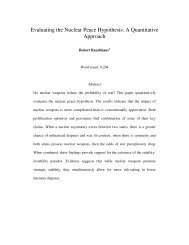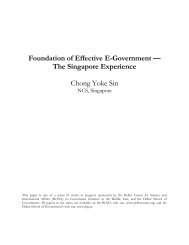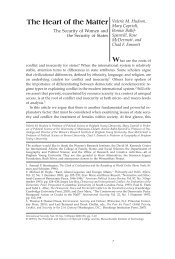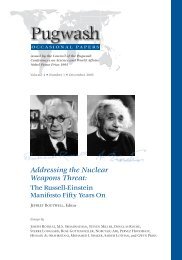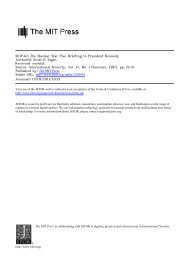Russia - Belfer Center for Science and International Affairs - Harvard ...
Russia - Belfer Center for Science and International Affairs - Harvard ...
Russia - Belfer Center for Science and International Affairs - Harvard ...
Create successful ePaper yourself
Turn your PDF publications into a flip-book with our unique Google optimized e-Paper software.
INTERNATIONAL SECURITY PROGRAM<br />
The <strong>International</strong> Security Program addresses the most important challenges to U.S. national security <strong>and</strong><br />
international security in the quarter-century ahead. As the first issue of the journal <strong>International</strong> Security stated<br />
in 1976, “We define international security broadly to include the full array of factors that have a direct bearing<br />
on the structure of the international system <strong>and</strong> the sovereignty of its members, with particular emphasis on<br />
the use, threat, <strong>and</strong> control of <strong>for</strong>ce.”<br />
Program researchers analyze security issues rigorously, draw prescriptive conclusions, <strong>and</strong> communicate their<br />
recommendations directly to makers of public policy <strong>and</strong> shapers of public opinion. The program also seeks<br />
to advance scholarship in security studies by contributing to significant academic debates through its own<br />
research activities <strong>and</strong> by publishing the leading journal in the field, <strong>International</strong> Security. Each year ISP<br />
develops <strong>and</strong> trains new talent in security studies by hosting a dozen pre-<strong>and</strong> postdoctoral research fellows.<br />
The program also presents its research in the book series, BCSIA Studies in <strong>International</strong> Security.<br />
INTERNATIONAL SECURITY<br />
The basic mission of <strong>International</strong> Security is to publish articles on defense <strong>and</strong> <strong>for</strong>eign affairs that combine<br />
policy relevance with scholarly analysis <strong>and</strong> research. The journal seeks to bridge the gap between<br />
contemporary security policy issues <strong>and</strong> academic research on international security studies. We define the<br />
field of international security studies broadly, to include nonmilitary as well as military threats to the security<br />
of states. Compared to some other journals, we also interpret policy relevance broadly to include many<br />
articles that bear on general theoretical questions - such as the causes of alliances or the role of international<br />
institutions - as well as historical topics, ranging from the origins of the First World War to U.S. nuclear<br />
strategy in the 1950's. As the editors of the journal wrote in its first issue, our intended audience includes the<br />
“scholars, scientists, industrialists, military <strong>and</strong> government officials, <strong>and</strong> members of the public who bear a<br />
continuing concern” <strong>for</strong> the problems of international security.<br />
BCSIA STUDIES IN INTERNATIONAL SECURITY<br />
In 1991 ISP created a new book series, the BCSIA Studies in <strong>International</strong> Security, to provide an outlet <strong>for</strong><br />
policy-oriented research <strong>and</strong> analysis in the field of international security. The first volume published in the<br />
series, Soviet Nuclear Fission: Control of the Nuclear Arsenal in a Disintegrating Soviet Union, attracted<br />
considerable attention <strong>and</strong> contributed directly to the passage of the original legislation (known as the Nunn-<br />
Lugar Act) authorizing the expenditure of U.S. funds to reduce the nuclear dangers in the <strong>for</strong>mer Soviet<br />
Union. Since that auspicious beginning, further titles have covered a diverse array of topics, including nuclear,<br />
biological <strong>and</strong> chemical weapons; other aspects of the nuclear dangers emanating from the <strong>for</strong>mer Soviet<br />
Union; the CFE treaty in Europe; <strong>Russia</strong>n <strong>for</strong>eign <strong>and</strong> security policy; transatlantic relations; security in the<br />
Middle East; <strong>and</strong> the democratic peace. The BCSIA Studies in <strong>International</strong> Security series is published by The<br />
MIT Press.<br />
<strong>International</strong> Security Program<br />
<strong>Belfer</strong> <strong>Center</strong> <strong>for</strong> <strong>Science</strong> <strong>and</strong> <strong>International</strong> <strong>Affairs</strong><br />
<strong>Harvard</strong> University, Kennedy School of Government<br />
79 John F. Kennedy Street<br />
Cambridge, Massachusetts 02138<br />
http://www.ksg.harvard.edu/bcsia<br />
Program phone number 617-495-4708 ~ Editorial office 617-495-1914 ~ Facsimile 617-496-4403<br />
58


